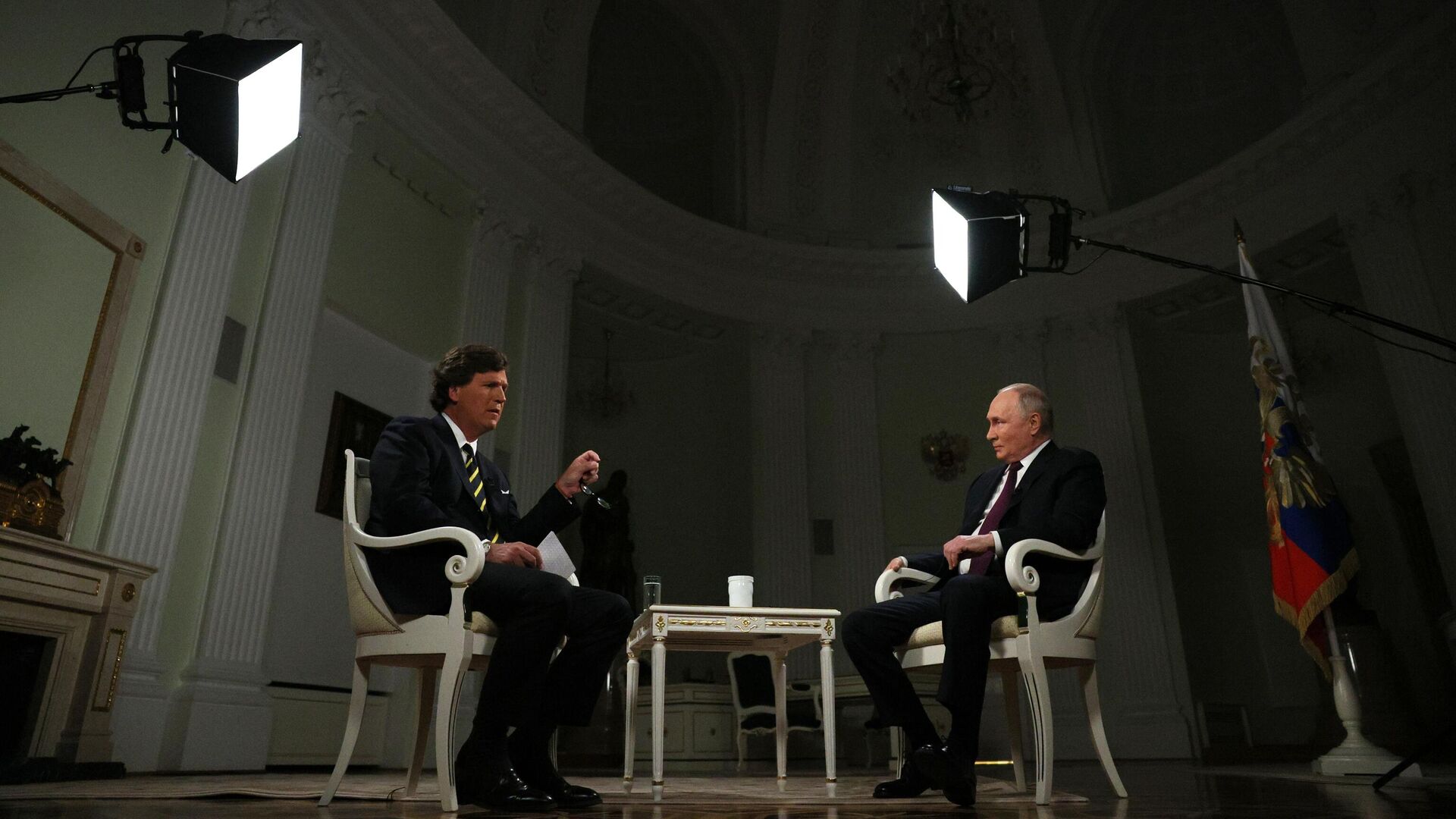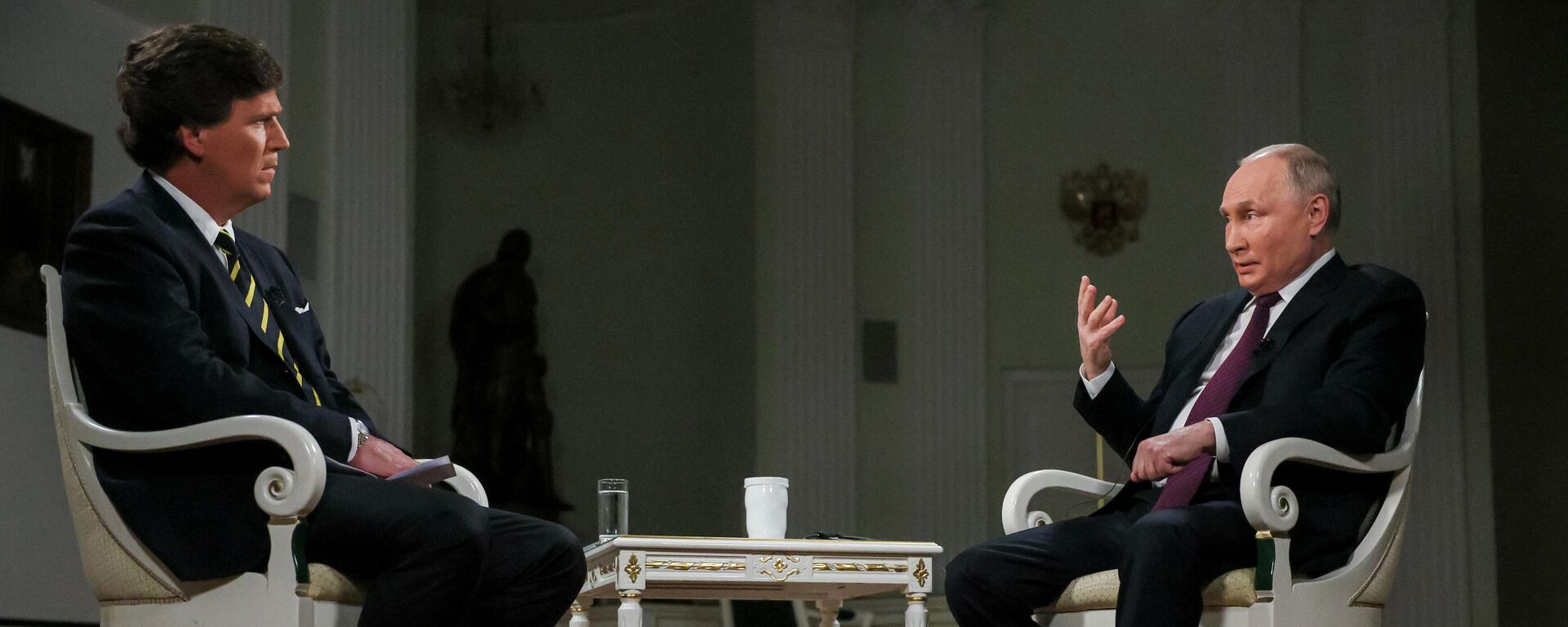https://en.sputniknews.africa/20240210/eye-opener-expert-comments-on-putins-geopolitical-insights-in-interview-with-carlson-1065008850.html
'Eye Opener': Expert Comments on Putin's Geopolitical Insights in Interview With Carlson
'Eye Opener': Expert Comments on Putin's Geopolitical Insights in Interview With Carlson
Sputnik Africa
An exclusive interview between a former Fox News host and the Russian leader was released on Thursday. The two-hour interview covered a variety of topics... 10.02.2024, Sputnik Africa
2024-02-10T13:59+0100
2024-02-10T13:59+0100
2024-02-10T13:59+0100
opinion
africa insight
vladimir putin
tucker carlson
international
russia
ukraine
europe
cia
brics
https://cdn1.img.sputniknews.africa/img/07e8/02/0a/1065009846_0:320:3072:2048_1920x0_80_0_0_df36622e21f32c215ba6a29c1edcd5ef.jpg
Russian President Vladimir Putin's interview with American journalist Tucker Carlson sheds light on the geopolitical situation in Eastern Europe, including Ukraine, Prof. Lere Amusan, Professor of International Relations at North-West University, told Sputnik Africa.Regarding Russia's actions in Ukraine, the professor noted that the majority of the country's inhabitants, especially in the area of the capital Kiev, are Russian-speaking, and Russia "cannot leave its own people because of the cultural implications and for the stability of its own country."In addition, by conducting a special military operation in Ukraine, Moscow seeks to ensure the political stability of Russia as a sovereign state and the stability of Europe as a whole, Amusan added.The professor added that the US CIA involvement in Ukraine, as revealed by Putin, "is an aggression on the stability of Eastern Europe," which is causing crises in other developing regions as well.The expert also drew attention to Putin's position on the Western anti-Russian sanctions, who called the US dollar Washington's instrument of foreign policy struggle. Amusan highlighted how Russia's resilience, coupled with the support of the BRICS nations, challenges the effectiveness of unilateral sanctions. The professor also called the US currency Washington's "agent of colonization and economic and political dominance."Western Media Influence on AfricaIn the interview, the Russian president also stated that "the ultimate beneficiary of the biggest European media are American financial institutions."Reflecting on the impact of the issue on Africa, Amusan noted that the continent's population relies on information from the United States and other Western countries. However, this narrative has recently begun to change, as evidenced by the withdrawal of Mali, Niger, and Burkina Faso from ECOWAS, the expert explained, urging African countries to have a better understanding of the geopolitical environment.
https://en.sputniknews.africa/20240209/full-text-putin-carlson-interview-1064991978.html
russia
ukraine
europe
Sputnik Africa
feedback@sputniknews.com
+74956456601
MIA „Rossiya Segodnya“
2024
Maxim Grishenkin
https://cdn1.img.sputniknews.africa/img/07e7/0a/17/1063018107_0:0:1104:1103_100x100_80_0_0_03090c85a11f5d2e8a19cf1d989443c9.jpg
Maxim Grishenkin
https://cdn1.img.sputniknews.africa/img/07e7/0a/17/1063018107_0:0:1104:1103_100x100_80_0_0_03090c85a11f5d2e8a19cf1d989443c9.jpg
News
en_EN
Sputnik Africa
feedback@sputniknews.com
+74956456601
MIA „Rossiya Segodnya“
Sputnik Africa
feedback@sputniknews.com
+74956456601
MIA „Rossiya Segodnya“
Maxim Grishenkin
https://cdn1.img.sputniknews.africa/img/07e7/0a/17/1063018107_0:0:1104:1103_100x100_80_0_0_03090c85a11f5d2e8a19cf1d989443c9.jpg
africa insight, vladimir putin, tucker carlson, international, russia, ukraine, europe, cia, brics
africa insight, vladimir putin, tucker carlson, international, russia, ukraine, europe, cia, brics
'Eye Opener': Expert Comments on Putin's Geopolitical Insights in Interview With Carlson
An exclusive interview between a former Fox News host and the Russian leader was released on Thursday. The two-hour interview covered a variety of topics, including the conflict in Ukraine, Moscow's relations with the Western world, anti-Russian sanctions, and more.
Russian President Vladimir Putin's
interview with American journalist Tucker Carlson sheds light on the geopolitical situation in Eastern Europe, including Ukraine,
Prof. Lere Amusan, Professor of International Relations at North-West University, told
Sputnik Africa.
"For me, the interview is an eye opener, it let us know exactly what is going on in the Baltic and in the eastern part of Europe and the rationale behind why Russia is in Ukraine, in order to maintain sanity in the region," the expert noted.
Regarding Russia's actions in Ukraine, the professor noted that the majority of the country's inhabitants, especially in the area of the capital Kiev, are Russian-speaking, and Russia "cannot leave its own people because of the cultural implications and for the stability of its own country."
In addition, by conducting a special military operation in
Ukraine, Moscow seeks to ensure the political stability of Russia as a sovereign state and the stability of Europe as a whole, Amusan added.
"Geopolitically, there is no way America can go into the eastern parts of Europe and think that Russia will never react, it is not possible because the stability of these neighboring countries dictate the stability of Russia itself. There is no leader in the world that will be seeing some instability next to his door and will keep quiet. So I believe what Vladimir Putin is doing is the best for the stability of Europe as a whole," the professor pointed out.
The professor added that the US CIA involvement in Ukraine, as revealed by Putin, "is an aggression on the stability of Eastern Europe," which is causing crises in other developing regions as well.
The expert also drew attention to
Putin's position on the Western anti-Russian sanctions, who called the US dollar Washington's instrument of foreign policy struggle. Amusan highlighted how Russia's resilience, coupled with the support of the BRICS nations, challenges the effectiveness of unilateral sanctions.
"What I believe is that Russia is technologically balanced to the extent that Russia can produce whatever it want and don't forget, there are so many countries that are not subscribing to the sanctions that are orchestrated by the US," the analyst stressed. "In essence, the issue of sanctions may not be achieved as it is expected by the rest of the world."
The professor also called the US currency Washington's "agent of colonization and economic and political dominance."
Western Media Influence on Africa
In the interview, the Russian president
also stated that "the ultimate beneficiary of the biggest European media are American financial institutions."
Reflecting on the impact of the issue on Africa, Amusan noted that the continent's population relies on information from the United States and other Western countries.
However, this narrative has recently begun to change, as evidenced by the withdrawal of Mali, Niger, and Burkina Faso from ECOWAS, the expert explained, urging African countries to have a better understanding of the geopolitical environment.
Amusan pointed out that "the misinformation from the Western world continues to affect the development of Africa." So the sooner African countries realize "what is going on in the international system, the better," he concluded.



